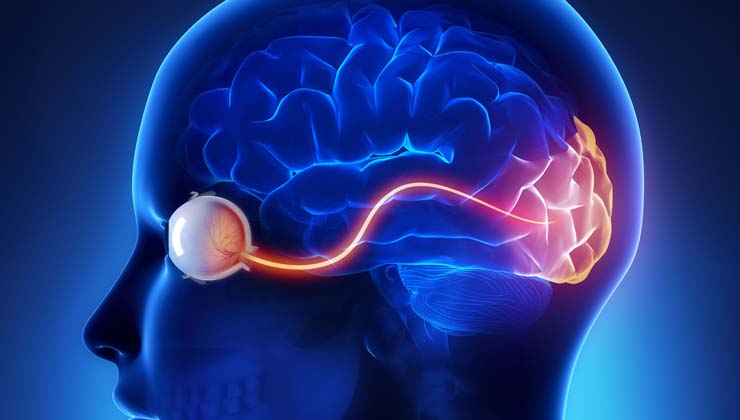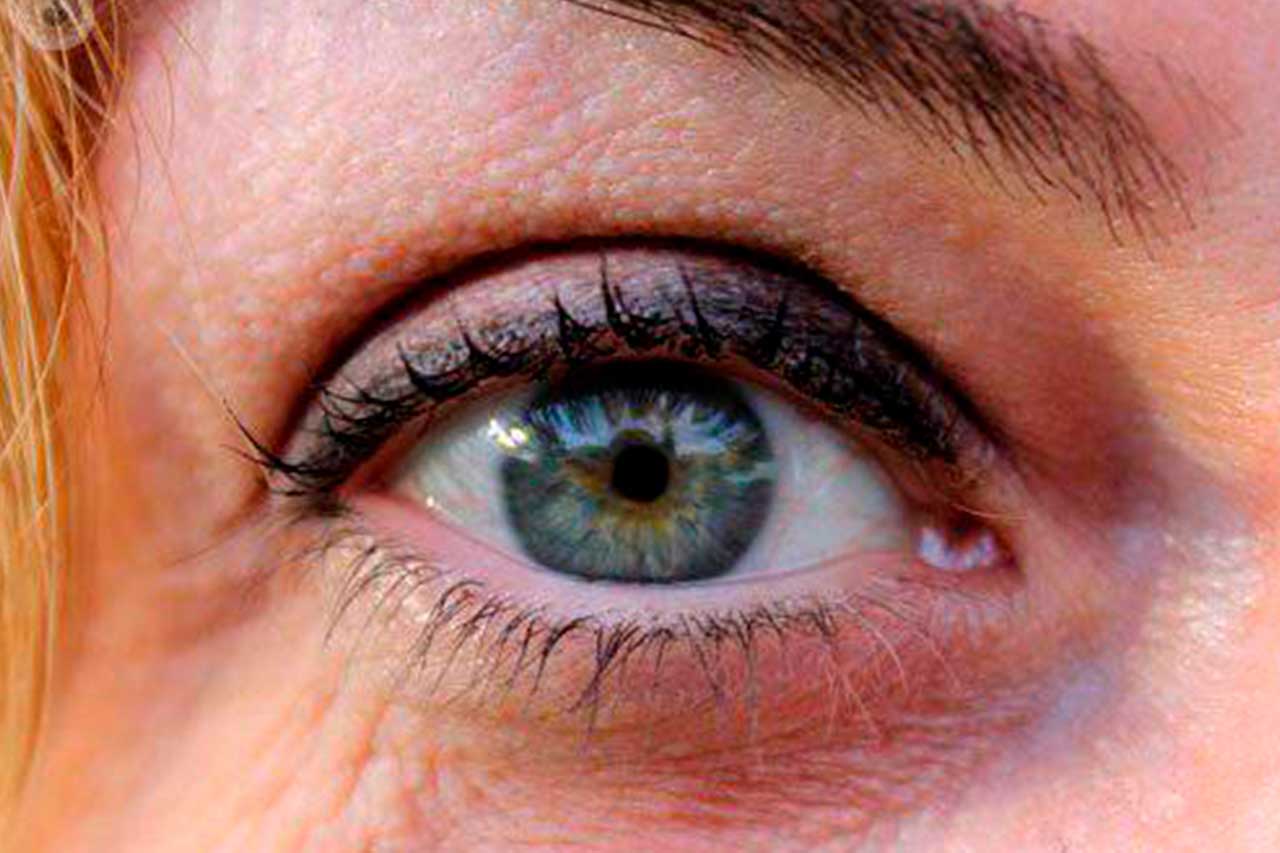An optic nerve is a group of nerve fibers that transmit visual information from your eye to your brain. Optic neuritis occurs when swelling (inflammation) damages it. Common symptoms of optic neuritis include pain with eye movement and temporary loss of vision in one eye.
Optic neuritis signs and symptoms can be the first indication of multiple sclerosis (MS), or it can occur later in the course of MS. MS is a disease that causes inflammation and damage to the nerves in the brain as well as the optic nerve.
In addition to MS, optic neuritis can occur with other conditions, including infection or immune disease, such as lupus. Rarely, another disease called neuromyelitis Optica can cause inflammation of the optic nerve and spinal cord.
Most people who have had a single episode of optic neuritis eventually regain their sight without treatment. Sometimes, steroid medications may speed the recovery of vision after optic neuritis. . In this topic, the Royal Spanish Center in Abu Dhabi publishes a set of important information about this disease.
Optic neuritis symptoms

Optic neuritis usually affects one eye, Symptoms may include:
- Pain: Most people with optic neuritis have eye pain that is made worse by eye movement. The pain sometimes feels like a dull ache behind the eye.
- Loss of sight in one eye. Most people experience at least a temporary decrease in vision, but the extent of the loss varies. Noticeable vision loss usually develops over a period of hours or days and improves over several weeks to months. Vision loss is permanent in some people.
- Visual field loss. Side vision loss can occur in any pattern, such as loss of central vision or loss of peripheral vision.
- Loss of color vision. Optic neuritis often affects color perception. You may notice that the colors appear less bright than usual.
- bright lights; Some people with optic neuritis report seeing flashing or flashing lights with eye movements.
When to see a doctor
- Contact the doctor Optic neuritis
Eye diseases can be serious. Some can lead to permanent vision loss, and others are associated with other serious medical problems. Call your doctor if:
- You develop new symptoms, such as eye pain or a change in vision.
- Your symptoms are worsening or not improving with treatment.
- You have unusual symptoms, including vision loss in both eyes, double vision, and numbness or weakness in one or more limbs, which may indicate a neurological disorder.
Causes of optic neuritis
The exact cause of optic neuritis is unknown. It is thought to develop when the immune system mistakenly targets the substance covering the optic nerve, resulting in myelin inflammation and damage.
Normally, myelin helps electrical impulses travel quickly from the eyes to the brain, where they are converted into visual information. Optic neuritis disrupts this process and affects vision.
The following autoimmune conditions are often associated:
- Multiple sclerosis. Multiple sclerosis is a disease in which your autoimmune system attacks the myelin sheath covering nerve fibers in your brain. In people with optic neuritis, the risk of developing multiple sclerosis after one episode of optic neuritis is about 50% over a lifetime. Your risk of developing multiple sclerosis after increases if an MRI scan shows lesions on your brain.
- Neuromyelitis Optica. In this case, the inflammation affects the optic nerve and spinal cord. Neuromyelitis Optica has similarities to multiple sclerosis, but neuromyelitis Optica does not damage the nerves in the brain as often as multiple sclerosis does. However, neuromyelitis Optica is more severe than MS and often leads to diminished recovery after an attack compared to MS.
- Disruption of myelin oligodendrocyte glycoprotein antibody (MOG ). This condition can cause inflammation of the optic nerve, spinal cord, or brain. Similar to MS and optic neuritis, recurrent episodes of inflammation can occur. Usually recovery from attack smog Better than recovering from myelitis Optica.
The Royal Spanish Center in Abu Dhabi offers a range of other tests to diagnose optic neuritis as follows:
- infections. Bacterial infections, including Lyme disease, cat scratch fever, and syphilis, or viruses, such as measles, mumps, and herpes, can cause optic neuritis.
- Other diseases. Diseases such as sarcoidosis, Behçet’s disease, and lupus can cause recurrent optic neuritis.
- Medicines and toxins. Certain medications and toxins have been associated with its development of it.
- Ethambutol is used to treat tuberculosis, and methanol, a common ingredient in antifreeze, paints, and solvents, has been linked to disease.
Risk factors
- Visit a doctor Optic neuritis
Risk factors for developing optic neuritis include:
- Age. most often affects adults between the ages of 20 and 40.
- sex. Women are more likely to develop the disease than men.
- Races: disease occurs more often in white people.
- genetic mutations. Certain genetic mutations may increase the risk of developing disease or multiple sclerosis.
Complications
Complications from optic neuritis may include:
- Optic nerve damage. Most people have some permanent optic nerve damage after an episode of optic neuritis, but this damage may not cause permanent symptoms.
- decreased visual acuity; Most people regain normal or near-normal vision within several months, but partial loss of color discrimination may persist. For some people, vision loss continues.
- Side effects of treatment. Steroid medicines used to treat optic neuritis suppress your immune system, making your body more susceptible to infections. Other side effects include mood changes and weight gain.
Diagnosis
You’ll likely see an ophthalmologist for a diagnosis, which generally depends on your medical history and exam. Your eye doctor is likely to perform the following eye exams:
- Routine eye examination. Your eye doctor will check your vision and ability to perceive colors and measure your side (peripheral) vision.
- ophthalmoscopy; During this exam, your doctor shines a bright light into your eye and examines the structures at the back of your eye. This eye test evaluates the optic disc, where the optic nerve enters the retina. The optic disc swells in about a third of people with optic neuritis.
- Pupillary light reaction test. Your doctor may move a flashlight in front of your eyes to see how your pupils respond when they are exposed to bright light. If you have optic neuritis, your pupils will not constrict as much as the pupils in healthy eyes when exposed to light.
Other tests to diagnose optic neuritis may include:
- Firstly MRI A magnetic field scan uses pulses of radio wave energy to make images of your body. During an MRI to check for optic neuritis, you may receive an injection of a contrast solution to make your optic nerve and other parts of your brain more visible in the images. An MRI is important to determine if there are damaged areas (lesions) in your brain. These lesions indicate a higher risk of developing multiple sclerosis. And MRI Other causes of vision loss, such as the presence of a tumor, can also be ruled out.
- Secondly Blood tests. A blood test is available to check for infection or specific antibodies. Neuromyelitis Optica is associated with an antibody that causes acute optic neuritis. People with severe optic neuritis may have this test to determine whether they are at risk of developing optic neuritis. For atypical cases of optic neuritis, the blood may also be tested for antibodies. MOG.
Other tests to diagnose optic neuritis may include:
- Thirdly Optical coherence tomography (OCT ). This test measures the thickness of the layer of nerve fibers in the retina, which is often thinner than optic neuritis.
- importantly Visual field test. This test measures the peripheral vision of each eye to determine if there is any vision loss. Optic neuritis can cause any type of visual field loss.
- Moreover evoked visual response. During this test, you sit in front of a screen on which an alternate chessboard pattern is displayed. Small patch cords are attached to your head to record your brain’s responses to what you see on the screen. This type of test tells your doctor if the electrical signals to your brain are slower than normal as a result of damage to the optic nerve.
- Your doctor will likely ask you to return for follow-up exams two to four weeks after symptoms begin to confirm a diagnosis.
Optic neuritis treatment
- Treatments available
- Optic neuritis usually gets better on its own. In some cases, steroid medications are used to reduce. Possible side effects of steroid treatment include weight gain, mood changes, flushing, upset stomach, and insomnia.
- Steroid therapy is usually given intravenously (intravenously). Intravenous steroid therapy speeds recovery of vision but does not appear to affect how much vision recovers from the typical disease.
- When steroid treatment fails and severe vision loss persists, a treatment called plasma exchange therapy may help some people restore their vision. Studies have not yet confirmed that plasma exchange therapy is effective in treating.
Prevent multiple sclerosis
In this paragraph, If you have two or more brain lesions seen on MRI scans, you may benefit from multiple sclerosis medications, such as interferon beta1a or interferon beta1b, which may delay or help prevent multiple sclerosis. These injectable medications are used for people at risk of developing MS. Possible side effects include depression, injection site irritation, and flu-like symptoms.
Glaucoma Symptoms, Treatment, and prevention
Preparing for your appointment with an ophthalmologist
In conclusion, The Royal Spanish Center in Abu Dhabi receives patients to provide them with medical assistance and consultations on an ongoing basis while providing the latest technologies in treatment and diagnosis. Because it is usually a serious eye disease. Some can lead to permanent vision loss, and others are associated with other serious medical problems. Call your doctor if:
If you have signs and symptoms, you’ll likely see your family a doctor who specializes in diagnosing and treating eye conditions (ophthalmologist or neuro-ophthalmologist).
Here’s some information to help you get ready for your appointment.
Prepare lists that include the following:
Your symptoms, especially vision changes.
- Key personal information, including any recent stresses, major life changes, and personal and family medical history, including recent injuries and other conditions you’ve had.
- All medications, vitamins, and other supplements you’re taking, including the doses.
- Questions to ask your doctor.
- Take a family member or friend along, if possible, to help you remember the information you’ll receive.
Questions to ask your doctor include:
What is the possible cause of my symptoms?
- Are there other possible causes?
- What tests do I need?
- Secondly, What treatments do you recommend for me?
- What are the possible side effects of the medications you’re recommending?
- How long will it take for a visual improvement?
- Does this put me at greater risk of developing multiple sclerosis, and if so, what can I do to prevent it?
- I have other health conditions. How can I best manage these conditions together?
- Do you have brochures or other printed material that I can have? What sites do you recommend?
- What do you expect from your doctor?
Your doctor is likely to ask you several questions, such as:
How would you describe your symptoms?
- The first question How low is your vision?
- As for the second question, Do the colors look less bright?
- While the third question Have your symptoms changed over time?
- For the fourth question, Does anything seem to improve or worsen your symptoms?
- finally, Have you noticed movement and coordination problems, numbness, or weakness in your arms and legs?




